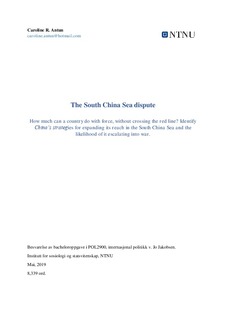| dc.description.abstract | The purpose of this dissertation is to identify China's strategies for expanding its reach in the South China Sea (SCS) and the likelihood of the conflict escalating into war. Research included a review of China's use of grey zone tactics such as salami slicing, fait accompli and intermediaries; neighbouring states reactions to Chinese expansionism and whether tensions appear to be rising. Through a qualitative document study using 148 newspaper articles from the Guardian, the findings suggest China use a combination of resource exploitation within other states Exclusive Economic Zones (EEZ), civilian expansionism and militarization of disputed islands to expand its reach in the SCS. The strategies applied are consistent with previous researchers' notion of grey zone tactics. In regards to neighbouring states' reactions to Chinese expansionism, the findings suggest China is increasingly being identified as an aggressor, which has led to some counter-balancing action. However, China has not provoked any overly aggressive reactions, suggesting China has been relatively successful in calculating the degree of aggression applied to stay under the threshold of response. Overall, as both China and the other claimant states has generally avoided the use of force, this seems to indicate that all parties want to avoid escalating the conflict. The chance of a misstep is present, however, due to the significant costs associated with war, the probability of conflict is considered to be relatively low. | |
